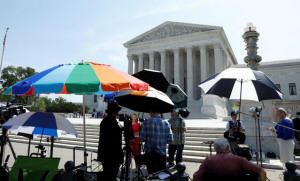|
Supreme Court sidesteps major rulings on
electoral map manipulation
 Send a link to a friend
Send a link to a friend
 [June 19, 2018]
By Andrew Chung and Lawrence Hurley [June 19, 2018]
By Andrew Chung and Lawrence Hurley
WASHINGTON (Reuters) - The U.S. Supreme
Court on Monday dealt a setback to election reformers by declining to
use high-profile cases from Wisconsin and Maryland to curb the ability
of state lawmakers to draw electoral districts purely for partisan
advantage.
Sidestepping major rulings, the nine justices decided both cases on
narrow legal grounds and put off perhaps until their next term, which
begins in October, a more definitive ruling on whether courts can step
in to limit the contentious practice known as partisan gerrymandering.
In the Wisconsin case, the court ruled 9-0 in favor of Republican
legislators who drew state electoral districts that helped entrench
their party in power, throwing out a lower court ruling that the map had
deprived Democratic voters of their constitutional rights including
equal protection under the law.
The ruling, authored by Chief Justice John Roberts, said the Democratic
voters who sued to block the electoral map lacked the necessary legal
standing because they challenged it statewide rather than focusing on
individual districts.

The ruling makes it harder, but not impossible, for plaintiffs to
challenge maps statewide. To do so, voters in every district in a state
must show their own voting clout has been harmed.
In the Maryland case, the court's unsigned opinion preserved a
Democratic-drawn U.S. House of Representatives district challenged by
Republican voters, but allowed the fight to continue in a lower court.
Election reformers in both parties had hoped the justices would rein in
the intensified use of partisan gerrymandering, a practice in which the
party that controls a state legislature uses the process of redrawing
electoral districts after the U.S. census every decade to tighten its
grip on power by diluting the influence of voters who tend to support
the rival party.
Opponents have said partisan gerrymandering has begun to warp American
democracy by muffling large segments of the electorate. Democrats in
particular have accused Republicans of escalating partisan
gerrymandering this decade, helping President Donald Trump's party
maintain control of the U.S. House of Representatives and state
legislatures.
Critics have said gerrymandering has become more extreme through the use
of precise voter data and computer modeling to devise electoral maps.
NORTH CAROLINA CASE
Roberts said the court was leaving for another day whether judges have
the power to remedy claims of unconstitutionally biased electoral maps.
The justices could soon take up a challenge to Republican-drawn
congressional districts in North Carolina that may give them another
chance in their next term for a broader ruling on partisan
gerrymandering.
The court's four liberal justices indicated more sympathy toward hearing
gerrymandering challenges. Justice Elena Kagan, joined by her fellow
liberals, wrote that at its most extreme, partisan gerrymandering
amounts to "rigging elections."
"Courts have a critical role to play in curbing partisan
gerrymandering," Kagan said.
[to top of second column]
|

Journalists use umbrellas against the sun outside the U.S. Supreme
Court on a day where the court handed a victory to Wisconsin
Republicans who drew state electoral districts that helped entrench
their party in power, but sidestepped a major ruling on whether
parties have carte blanche to engage in the practice called partisan
gerrymandering in Washington, U.S., June 18, 2018. REUTERS/Kevin
Lamarque

Gerrymandering usually involves packing voters who tend to favor a
particular party in a small number of districts to diminish their
statewide voting power while scattering others in districts in
numbers too small to be a majority.
"The Supreme Court missed an opportunity today to lay down a firm
marker as to when partisan gerrymandering is so extreme that it
violates the constitutional rights of voters. But the court
permitted lawsuits against unfair maps to continue," said Dale Ho, a
lawyer with the American Civil Liberties Union.
Democratic Party voters in Wisconsin sued state election officials
in 2015 claiming a Republican-drawn legislative map was intended to
discriminate against them for their political beliefs and create
enduring Republican majorities.
While the state Democratic Party vowed to fight on, the state's
Republican attorney general, Brad Schimel, called the ruling a "win
for the rule of law in Wisconsin."
"In the future the court should go further and rein in the flood of
political gerrymandering litigation that is clogging federal courts
with dubious political science theories," added the National
Republican Redistricting Trust's legal counsel, Jason Torchinsky.
The justices sent the Wisconsin case back to a lower court, though
conservative Justices Clarence Thomas and Neil Gorsuch said they
would have dismissed it outright.
University of Chicago Law School professor Nicholas Stephanopoulos,
a lawyer for the plaintiffs, said the Democratic challengers will
likely add voters from other Wisconsin districts to continue the
case.
"I see today's decision as a punt and as a complication for future
litigants, but very far from a devastating defeat," Stephanopoulos
added.

Republican voters sued Maryland after the legislature in 2011 redrew
boundaries for a largely rural congressional district north of
Washington in a way that removed Republican-leaning areas and added
Democratic-leaning areas. The five-page ruling did not resolve the
merits of the plaintiffs' claims.
Redistricting in most states is done by the party in power, though
some states in the interest of fairness assign the task to
independent commissions.
(Reporting by Andrew Chung and Lawrence Hurley; Editing by Will
Dunham)
[© 2018 Thomson Reuters. All rights
reserved.]
Copyright 2018 Reuters. All rights reserved. This material may not be published,
broadcast, rewritten or redistributed.
Thompson Reuters is solely responsible for this content. |